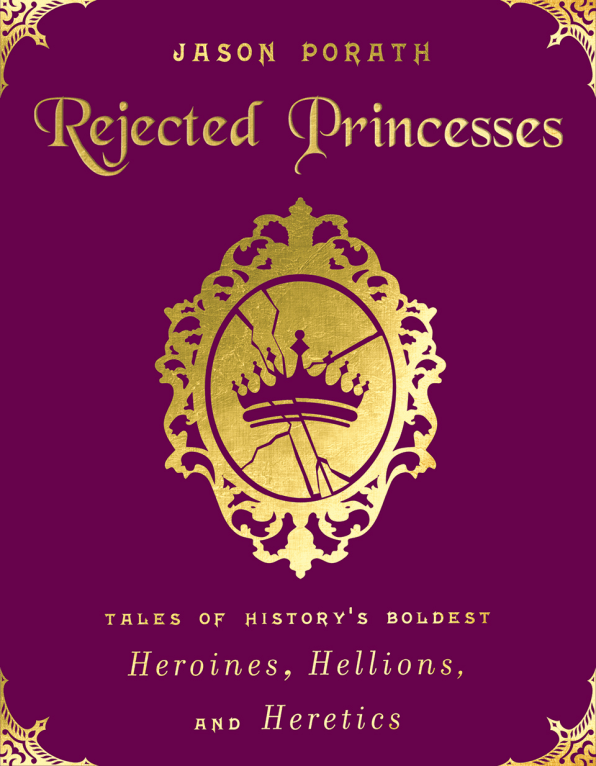Disney Princess With a Parent and Stepparent
The fact that Frozen is a radically feminist Disney movie says more about the low bar for feminism in Disney movies than it does about Frozen's hurdle-clearing capacity.
In that film, the romantic love story is a red herring and the real love story is borne out between sisters Elsa and Anna, who save the day using only their wits and ice powers. It shouldn't be all that groundbreaking, but in a world where the distressed damsel trope reigned supreme for so long, it sure feels that way. The process of introducing Ariel and Beauty to Alison Bechdel has been glacial, and the worst part is that history is full of awe-inspiring female candidates for feature film treatment. Jason Porath has devoted the last couple years to bringing their stories to the forefront.

Porath first popped up on Co.Create's radar back in 2014, when he began his Rejected Princesses project. It's a masterfully illustrated online counterpoint to the ineffectual princesses who exist in all too many forms as trophies or plot devices. Instead, Rejected Princesses spotlighted historical heroines like Mai Bhago, 18th-century Sikh warrior-saint and only survivor of the Battle of Khidrana and Corn Maiden, the mythological Native American figure who purportedly fixed a corn shortage by making corn out of her body. The project was a huge success. Rejected Princesses went viral, earning Porath a book deal. Now the former Dreamworks animator is able to do something he's been trying to do for a long time.
"Rejected Princesses is a way to tell more difficult stories without watering it down to appeal to a massive audience," he says. "I'm a studio of one. I don't need a massive audience. I only need to support myself."
Back at Dreamworks Animation, the studio behind the Shrek franchise and more, directors and producers would regularly screen early cuts of their films for employees and solicit suggestions. As someone with a degree in film criticism, Porath relished this opportunity to weigh in, and offered long detailed screeds. Nobody ever responded to them, though. Eventually, Porath came to understand these comments were more or less votes to be tallied in Rotten Tomatoes-like aggregate, and only acted upon in instances of an overwhelming mandate. Once he realized that, the animator tried to start juking the stats to game the system.
"When I felt very strongly about something, I'd urge my co-workers to write the same note, to give it more weight," Porath says. "On How to Train Your Dragon 2, I really wanted Astrid, the badass female Viking from the first movie, to have a more prominent role. I argued she should be chief at the end of the movie. Her role was improved–she got more moments to strut her stuff–but I still felt it was a betrayal of her character. I felt that she went from a three-dimensional foil to a two-dimensional girlfriend."

This kind of compromise is all too common in the Hollywood system. But with Rejected Princesses, Porath is circumventing the system. He chooses historical figures whose stories cross genres and sometimes moral boundaries, but never rely on male protagonists to save their hides. He's been lovingly crafting illustrations for these stories online for years now, and is excited to have created a physical representation of them.
The book itself is as striking as the unsung heroines within its pages—muted mauve-colored with an emblem of a cracked mirror, mirror on the wall. It has the feel of the kind of gigantic storybook that flips open at the beginning of a Disney movie, before we zoom in on the page and into the action. This is not by accident.
"I wanted the book to be an artifact, to feel timeless," Porath says. "It's patterned after medieval illuminated manuscripts, with a modern flair. It was important to me that it have some heft."
Of course, while many of these stories come from ancient eras, the story of a modern female pioneer was unfolding in real time. And it didn't end the way Porath hoped.
"It's tragic. Hillary Clinton lived a lifetime being torched under a magnifying glass, and, iron-clad as she is, the burn marks were evident," he says. "Her policies and flaws were on par with almost any male politician's. But her ambition made her seem a little 'off' to many. Unfamiliar. Unsettling. We live in a world that has no place for imperfect women."
Despite Clinton's loss, Porath is still able to pull an optimistic lesson out of her life and career–something he is used to doing with the Rejected Princesses that populate his book.
"Go back and look at early videos of her," he says. "She was an ordinary person, same as you or me or anyone. But she stepped up. If I have learned anything from this project, it is that history is made by ordinary people who stepped up. Noor Inayat Khan: pacifist musician turned phenomenal WW2 spy. Ching Shih: unknown prostitute turned history's greatest pirate. Wilma Rudolph: polio patient turned Olympic gold medalist. I cover countless underdogs who've beaten the odds, who've conquered, who've slayed. They are our heritage. They are our lineage. They are our mothers and grandmothers.
We are the latest links in an unbreakable chain of fearless, indomitable, ordinary people. And we can step up."
Rejected Princesses is in stores now. Have a look through the slides above for a further glimpse of what's inside the book.
Disney Princess With a Parent and Stepparent
Source: https://www.fastcompany.com/3065658/too-badass-for-disney-meet-the-rejected-princesses
0 Response to "Disney Princess With a Parent and Stepparent"
Post a Comment